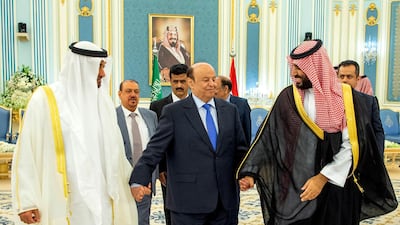This week, the Yemeni government and its former ally the Southern Transitional Council (STC) have signed a Saudi-brokered deal, agreeing to join their forces once again to fight against extremists such as Al Qaeda, as well as the Iran-backed Houthi rebels. This is good news for the people of Yemen, as it brings warring factions one step closer to engaging in a peace process that has stalled since the signing of the Stockholm agreement between the Houthis and the government forces last December.
The UN-brokered deal included a ceasefire in the port city of Hodeidah, the opening of a humanitarian corridor for the movement of aid as well as a prisoner swap between the Houthi rebels and the country’s internationally recognised government, that aimed to build confidence.
Since then, the political landscape has been even more fractured as the STC, led by General Aidrous Al Zoubaidi, fell out with government forces they were allied to, ousting Yemeni President Abdrabu Mansur Hadi’s internationally recognised government from Aden, the country’s temporary capital, where clashes erupted.
The deal brokered by Riyadh and signed jointly by Mr Hadi and Gen Al Zoubaidi has paved the way for these two factions to work together again and solve some of their longstanding differences.
Many southern Yemenis had felt marginalised by the national government formed after the unification of Yemen in 1994. Even after the fall of Ali Abdullah Saleh, Yemen’s former president who had allied himself with the Houthis, the STC had been excluded from government. But under this Saudi-brokered deal, the STC will enjoy equal representation within a new government, which will be formed in the coming days. The group is also to be included in talks regarding the peace process in Yemen, and will be considered as an official partner of the Arab Coalition led by Saudi Arabia.
In return, Mr Hadi’s government should be able to return to Aden and STC forces will be incorporated into the Yemeni government’s defence and interior ministries.
This fruitful effort has been praised by the UN special envoy for Yemen Martin Griffiths, who views it as a crucial step “to advance a peaceful settlement to the conflict” and commended Saudi Arabia’s mediation in this deal.
Sheikh Mohamed bin Zayed, Crown Prince of Abu Dhabi and Deputy Supreme Commander of the Armed Forces, and Saudi Crown Prince Mohammed bin Salman attended the signing in Riyadh, proving that the two Gulf nations are committed to peace in Yemen as they continue to stand by the country’s internationally recognised government and its allies on the ground.
The international community has also hailed the deal as a success for the Yemeni peace process. The UK has praised Saudi Arabia’s efforts in securing the deal, while US President Donald Trump has described the agreement as a “very good start” and urged all parties to “work hard to get a final deal”. Hundreds of ordinary people also took to the streets of southern Yemen to celebrate a deal that has given them hope for a better future.
As for the rebels, Mohammed Ali Al Houthi, a member of the Houthi council has declared the deal “will amount to nothing”. The Houthi reaction to this milestone, showed what little concern the armed militia has for ending the war.
For the first time since last December, Yemenis have reason to hope that better days lie ahead. The Houthis owe it to the people of Yemen to show a true interest in peace, instead of condemning any efforts to end the bloodshed.

